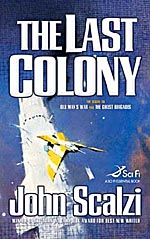
![]() verkisto
verkisto
7/26/2016
![]()
If a title like The Last Colony doesn't suggest that there's going to be some tragedy involving a story about colonizing a planet, then naming that colony "Roanoke" will. I'm sort of surprised that Scalzi didn't go so far as to call the ship taking the colonists there "Titanic" or "Mary Celeste," just to drive that point a bit further home.
The Last Colony wraps up the initial trilogy that began with Old Man's War, and it's an interesting look back over the three books to see how they correlate. The first and third books feature John Perry as the narrator, while the second book was told from the third person, and didn't feature Perry at all. Other characters who tie the three books together did, but it seemed a bit odd to me that the three books didn't maintain that characteristic. I'm not complaining, mind you -- the story still rockets along at a pace comparable to the Skip drives -- but it was something that stood out to me.
Like The Ghost Brigades, The Last Colony focuses in one one story instead of jumping around different events like we saw in Old Man's War, and like The Ghost Brigades, I think The Last Colony is a better book for its focus. The three books together have an overarching story about the Colonial Union and humans, tying them all together, but the series is less like, say, A Song of Ice and Fire, where the story that encompasses the entire series is more important than the individual stories told in each volume. I can see a reader easily picking up any of these books and enjoying them without having to read the rest of the books (though, if someone reads one and likes it, what's stopping them from reading the rest of them?).
So, I raced through this book in about 24 hours, and will be starting Zoë's Tale as soon as I finish with this review. If that's not enough to encourage you to read it yourself, then I don't know what else to do for you. All I'll say is that if you haven't read anything by John Scalzi, find a copy of Old Man's War and get to work. You'll thank me for it.